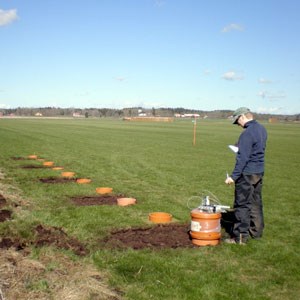Contact
Lisbet.Norberg@slu.se, 018-671187

Lisbet Norberg has assessed greenhouse gas emissions from drained peatlands and carbon-rich soil in a new doctoral thesis. She found great variations in emissions between and within sites and over time. The results are important to consider in management plans for peat soils.
In the mid-19th century peatlands were drained for agricultural purposes. Today, climate change is a major concern and temperatures are rising mainly due to anthropogenic release of greenhouse gases such as carbon dioxide, nitrous oxide and methane. About 6-8% of the anthropogenic greenhouse gas emissions in Sweden come from agricultural organic soils that used to be peatlands. Therefore, on-farm management and mitigation strategies are important.
Lisbet Norberg has studied greenhouse gas emissions from drained peatlands and carbon-rich soils that are in active agricultural use in a new doctoral thesis. She examined the impact of cropping system, soil type and drainage to identify different options to decrease greenhouse gas emissions from organic soils.
The overall conclusion from Lisbet’s field and laboratory studies was that there are great variations in greenhouse gas emissions between peat soil sites, but also within sites and over time. No specific cropping system can be recommended as a better option for limiting greenhouse gas emissions from cultivated organic soils now.
Not any of the measured soil properties could explain the emissions of carbon dioxide, while nitrous oxide was negatively correlated to pH. The laboratory studies showed that different peat soils responded differently to drainage and generally, increased drainage (below 50 cm) did not increase the carbon dioxide emissions.
– The conclusions from the thesis are important to consider in future management plans for peat soils. In the future, we need more research to better monitor these drained, cultivated peatlands in terms of greenhouse gas emissions and to give better recommendation on how to best manage agriculture on these lands, says Lisbet Norberg.
Lisbet till defend her thesis “Greenhouse Gas Emissions from Cultivated Organic Soils. Effect of Cropping System, Soil type and Drainage”. on the 19th of May. Associate Professor Florence Renou-Wilson from the School of Biology and Environmental Science, University College Dublin in Dublin, Ireland, will be opponent.
Lisbet.Norberg@slu.se, 018-671187